With a Stan Rogers musical in rehearsal next to the Reinventorium, my days are filled with novel interpretations of Rogers’ canon. It’s equal parts enervating and thrilling; regardless, I find myself whistling 45 Years on the way home most days.
In this light, Barrett’s Privateers Explored is an excellent read:
Stan Rogers basically made up an imaginary privateer to carry a 60s anti-war theme in a traditional folk setting. Having said all that, many of the details, ranging from the type of cannons mentioned to the letter of marque reference, are very authentic. Stan Rogers did a fair bit of reading about privateering and appears to have been influenced by the historian Archibald MacMechan, who wrote several books on Canadian privateers, as well as a privateering song of his own.
It’s a line by line breakdown of the song. The song that by summer’s end will be burned into my ears.
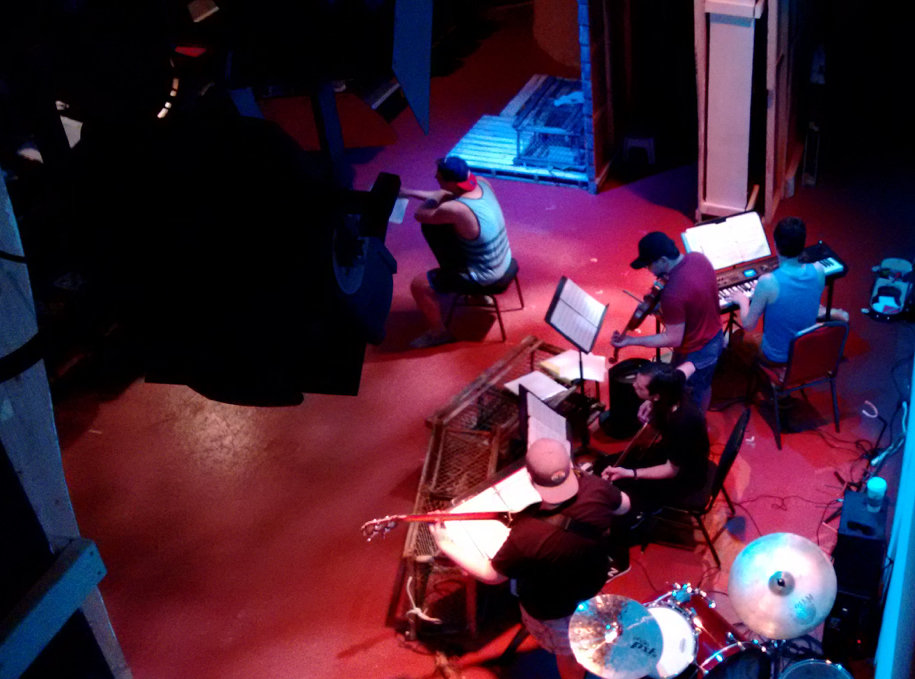
So I built myself this:
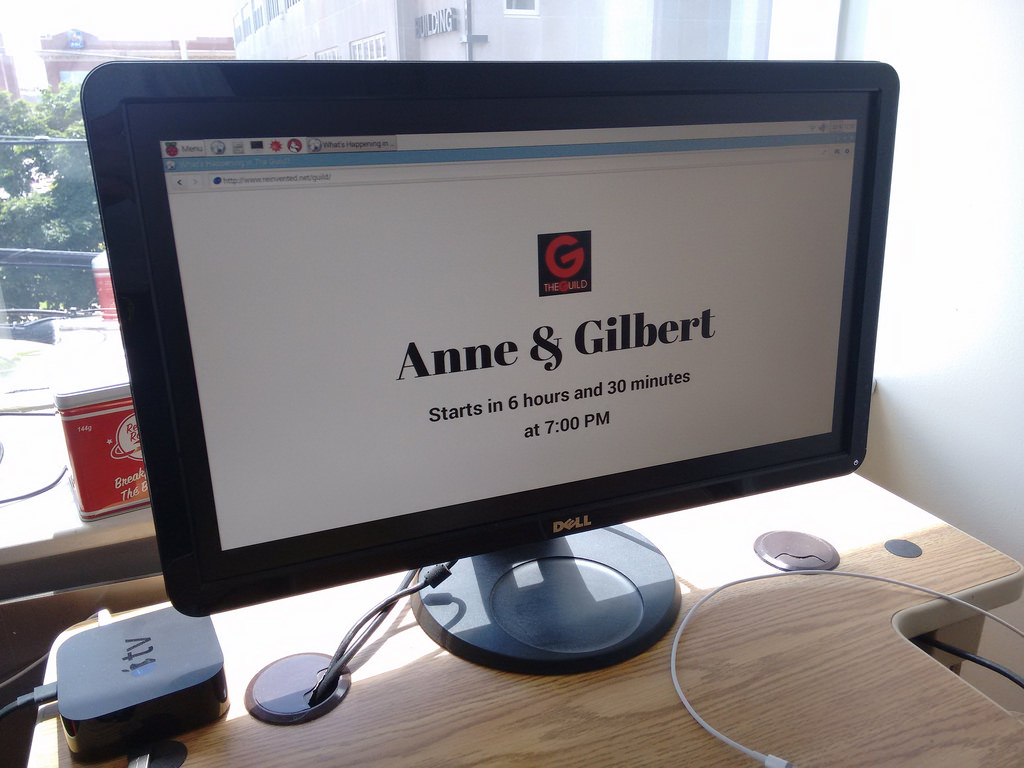
It’s an early warning system for performances in The Guild theatre, which sits mere inches from my office. It uses this schedule-harvesting code to pull an iCalendar version of the theatre schedule, and then this PHP iCalendar parser to look for what’s playing next. It runs in on a Raspberry Pi browser, and sits at the end of my office.
So now I’m never caught unawares by heartfelt belting outs of of passionate musical theatre anthems.
I developed a sudden surge of obsession this morning about whether the community I was in last night for Small Halls Songwriters’ Circle is called St. Peters or St. Peter’s. Or maybe St. Peters Bay? Or is it St. Peter’s Bay?
The community’s website features a logo that uses St. Peter’s Bay – with the apostrophe and with the Bay:

But, elsewhere on the website, you’ll find both St. Peters Bay (no apostrophe, with Bay) and St. Peter’s (with apostrophe, no Bay).
The Municipalities Act lists the name as St. Peters Bay (no apostrophe, with Bay):
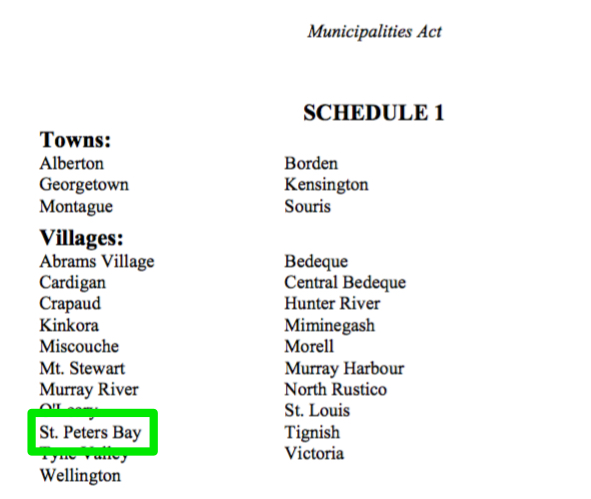
This agrees with the record in the Geographical Names Board of Canada database for the community:
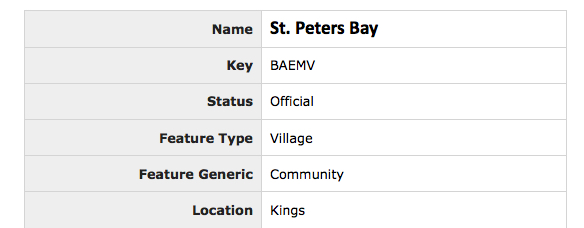
and with the Province of PEI’s PlaceFinder (which is derviced from that database), which provides the history of the name:
St. Peter (Sett.) was adopted in Place Names of PEI, 1925. Name changed to St. Peters (St. Peters Bay P.O.) (Village) 3 December 1946 on 11L/7. Village was incorporated in 1953. Village status changed to Inc. Community in 1983 by the Municipalities Act. Dual name changed to St. Peters Bay (Comm.) 31 Dec. 1989 on 11L/7.
Somewhat confusingly, the official civic addresses in the community are in St Peters (no period, as is standard for civic address communities, but also no Bay). The same applies to the name of St Peters Rd, which runs through the community. Which means that the civic address of the community office is:
Community of St. Peters Bay
5599 St Peters Rd - Rte 2
St Peters, PE
Canada Post, for reasons unknown, uses a dash between the “St” and the “Peters” and doesn’t use a period. But only for the name of the community; the name of the road doesn’t have a dash. Meaning that the mailing address for the same office is:
Community of St. Peters Bay
5599 St Peters Rd - Rte 2
St-Peters Bay, PE
To confuse matters somewhat, the Catholic parish in the community is known as St. Peter’s (with apostrophe):

Perhaps the name of the church falls under a different rule set than the name of the community, so this divergence can be explained — it is Saint Peter’s Basilica in Rome, after all, with an apostrophe.
Except that the name of the church on the church itself is St. Peter’s Bay Roman Catholic Church (with the apostrophe, with the Bay), which bridges heaven and earth in a most uncomfortable way:

Assuming the sign has it right, this would make the mailing address of the church, following everyone’s rules:
St. Peter’s Bay Roman Catholic Church
1843 Greenwich Rd
St-Peters Bay, PE
That just about breaks my brain.
Just in case your brain is also broken, here’s a cheat sheet:
| RULE MAKING BODY | COMMUNITY NAME |
|---|---|
| The Community | St. Peter’s Bay |
| Government of Prince Edward Island | St. Peters Bay |
| PEI Civic Addressing System | St Peters |
| Government of Canada | St. Peters Bay |
| Canada Post | St-Peters Bay |
Good luck.
In theory you can now read this blog in Apple News. Just visit this link from an iOS device.
Unless you’re not in the USA.
Because Apple News only works in the USA. Unless you fool your device into thinking you’re in the US.
Which is what I had to do to make sure it’s working.
Right now I’m simply piping my RSS feed to Apple; I’m in the midst of experimenting with the Apple News module for Drupal to see if it improves this in any way.
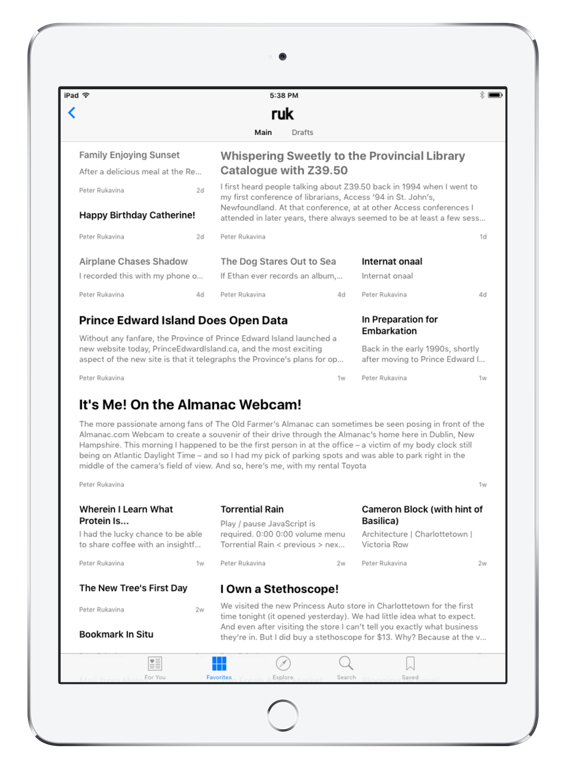
Back in May, after visiting Harald the printer in Berlin, I suggested I might create a book of the collection of klischees I have on loan. Today I set out to workshop this idea, and what you see below is one artifact of that.
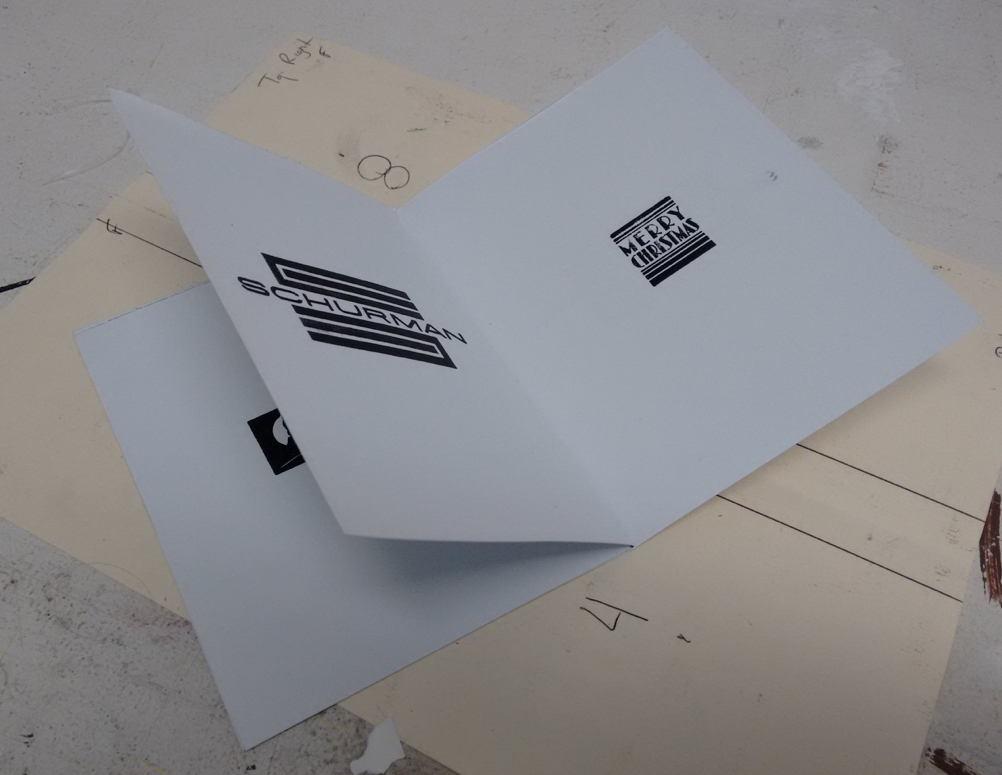
I’ve taken a standard piece of letter-size card stock and, using what I learned about imposition four years ago, set up four klischees to print in the proper place. To enable this to happen in a way that would allow me to quickly run through a large collection without having to reset the whole chase every time, I rigged up a set of furniture and quoins that lets me easily set and lock the position of each klischee in place; it’s this rigging that makes making the book possible:
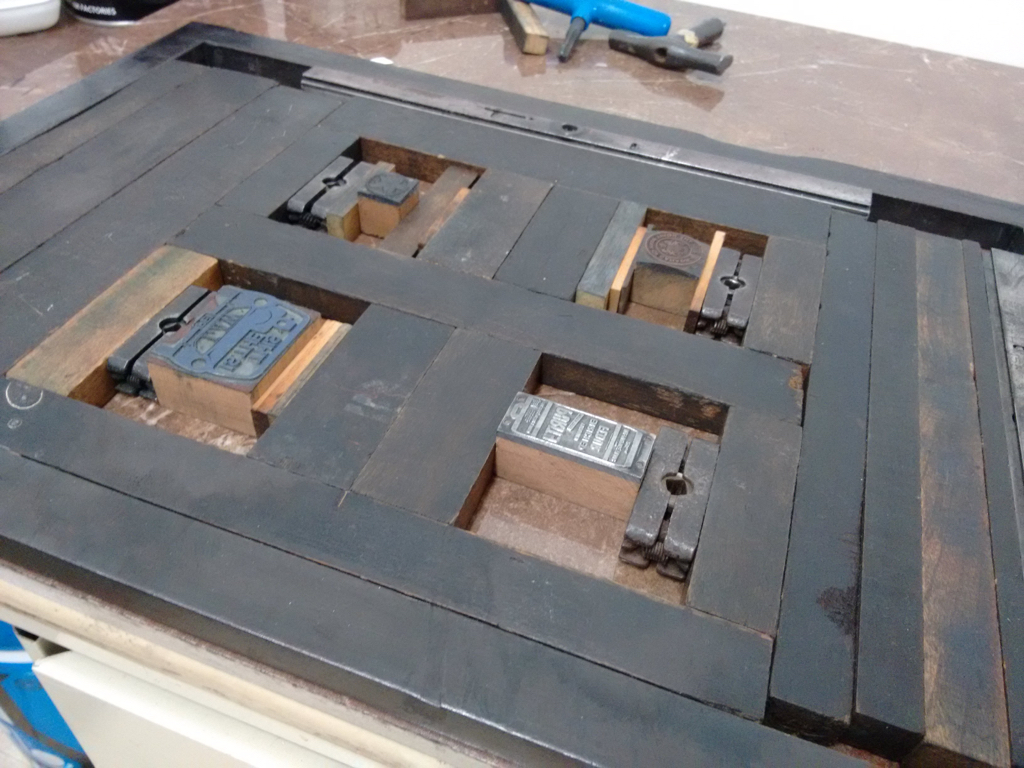
For my “workshop” of this project I printed 4 sheets; I’ll go back tomorrow and print the reverse site of each, then experiment with binding the quartos together.
I first heard people talking about Z39.50 back in 1994 when I went to my first conference of librarians, Access ‘94 in St. John’s, Newfoundland.
At that conference, at at other Access conferences I attended in later years, there always seemed to be at least a few sessions about Z39.50.
Like “Z39.50 for finding it all” at Access 2002 in Windsor.
To me, a non-librarian, Z39.50 seemed like the darkest of dark library arts: a secret language that librarians whispered to their systems, out of earshot of we civilians. That it had such an arcane name only reinforced this.
Simply by osmosis over those years, I’ve managed to deduce that Z39.50 is a protocol for speaking to library catalogues: in the same way that our web browsers speak to our web servers using a protocol called HTTP, library clients can talk to library catalogue servers using Z39.50.
Z39.50 may be a dark art, but it’s an open dark art, and most automated library systems will respond to you if you talk to them using the protocol.
To speak Z39.50 you need a client – a program that will communicate via Z39.50 with a catalogue – along with the IP address and port number of the server.
The open source YAZ toolkit is a solid client, and it comes in a PHP flavour called PHPYAZ that’s a good place to start experimenting. If you have a Mac and Homebrew you can install it with:
brew install --universal yaz --without-icu4c
This will, among other things, leave you with a command line client named yaz-client.
Here in Prince Edward Island our Provincial Library System’s catalogue listens for Z39.50 on port 2200 on host address 24.224.240.217, so to start speaking to it with YAZ it’s:
yaz-client 24.224.240.217:2200
To which the catalogue responds:
Connecting...OK.
Sent initrequest.
Connection accepted by v3 target.
ID : Unicorn 3.4.1 Bath
Name : SIRSI Corporation
Version: 3.0
Options: search present delSet scan sort namedResultSets
Elapsed: 0.349298
Z>
And then it sits there, waiting for a command.
So let’s go.
First, we’ll search the catalogue for records containing “Wade MacLauchlan” using the find command:
Z> find "Wade MacLauchlan"
The response is:
Sent searchRequest.
Received SearchResponse.
Search was a success.
Number of hits: 2, setno 1
records returned: 0
Elapsed: 0.062955
So there are two records in the catalogue that match; we can show them with the show command. We’ll ask for the second one:
Z> show 2
Sent presentRequest (2+1).
Records: 1
[DEFAULT]Record type: USmarc
(Length implementation at offset 22 should hold a number. Assuming 0)
02314 am a22005298i 4500
001 000042512248
003 CaOOAMICUS
005 20140328122422.0
008 140328s2014 pica b 001 0beng
016 $a 20149019998
020 $a 9780920434406 (bound)
040 $a CaOONL $b eng $e rda $c CaOONL
043 $a n-cn-pi
055 0 $a FC2625.1 C34 $b M33 2014
082 0 $a 971.7/04092 $2 23
090 $a PEI 921 CAM 2014
100 1 $a MacLauchlan, Wade, $e author.
245 10 $a Alex B. Campbell : $b the Prince Edward Island premier who rocked the cradle / $c H. Wade MacLauchlan.
264 1 $a Charlottetown, Prince Edward Island : $b Prince Edward Island Museum and Heritage Foundation, $c 2014.
300 $a 410 pages : $b illustrations ; $c 24 cm.
336 $a text $b txt $2 rdacontent
337 $a unmediated $b n $2 rdamedia
338 $a volume $b nc $2 rdacarrier
504 $a Includes bibliographical references and index.
600 10 $a Campbell, Alexander B., $d 1933-
651 5 $a Prince Edward Island $x Politics and government $y 1959-1979.
650 0 $a Premiers (Canada) $z Prince Edward Island $v Biography.
650 0 $a Politicians $z Prince Edward Island $v Biography.
710 2 $a Prince Edward Island Museum and Heritage Foundation, $e issuing body.
596 $a 1 3 4 5 6 7 9 10 16 17 19 22 24 25 26
926 $a ALB $b PEICOLL $c PEI 921 CAM 2014 $d PEIBOOK $f 1
926 $a BOR $b PEICOLL $c PEI 921 CAM 2014 $d PEIBOOK $f 1
926 $a BRE $b PEICOLL $c PEI 921 CAM 2014 $d PEIBOOK $f 1
926 $a CHA $b ANF $c PEI 921 CAM 2014 $d PEIBOOK $f 1
926 $a CHA $b PEICOLL $c PEI 921 CAM 2014 $d PEIBOOK $f 2
926 $a CHA $b PEICOLL $c PEI 921 CAM 2014 $d PEINCIRC $f 1
926 $a CHA $b CHECKEDOUT $c PEI 921 CAM 2014 $d PEIBOOK $e 5/7/2016 $f 2
926 $a COR $b PEICOLL $c PEI 921 CAM 2014 $d PEIBOOK $f 1
926 $a GEO $b PEICOLL $c PEI 921 CAM 2014 $d PEIBOOK $f 1
926 $a GSL $b PEICOLL $c PEI 921 CAM 2014 $d PEIBOOK $f 1
926 $a MON $b PEICOLL $c PEI 921 CAM 2014 $d PEIBOOK $f 1
926 $a MOR $b PEICOLL $c PEI 921 CAM 2014 $d PEIBOOK $f 1
926 $a MYH $b PEICOLL $c PEI 921 CAM 2014 $d PEIBOOK $f 1
926 $a SOU $b PEICOLL $c PEI 921 CAM 2014 $d PEIBOOK $f 2
926 $a STR $b PEICOLL $c PEI 921 CAM 2014 $d PEIBOOK $f 1
926 $a SUM $b PEICOLL $c PEI 921 CAM 2014 $d PEIBOOK $f 1
926 $a TIG $b CHECKEDOUT $c PEI 921 CAM 2014 $d PEIBOOK $e 21/6/2016 $f 1
This is a MARC record — another one of librarianship’s dark arts — that describes the book Alex B. Campbell : the Prince Edward Island premier who rocked the cradle. Each line of the record tells us something different about the book and copies of it. Lines starting 090, for example, are for Local Call Numbers and so the line:
090 $a PEI 921 CAM 2014
tells us that the call number for this book – what you’ll use to find it on the shelf — is PEI 921 CAM. And, sure enough, that’s what the online public catalogue tells us too.
The lines starting with 926 are about the holdings information for this book — what library branches it can be found in. So, for example, the line:
926 $a CHA $b CHECKEDOUT $c PEI 921 CAM 2014 $d PEIBOOK $e 5/7/2016 $f 2
tells us that there’s a copy that was checkout out (CHECKEDOUT) from the Confederation Centre Public Library in Charlottetown (CHA) that’s due back on July 5, 2016 (5/7/2016).
Dark arts though Z39.50 and and the MARC format be, they are well-documented, structured data, and that’s gold for someone who’s interested in automated interactions with a library catalogue.
Imagine, for example, that I’m visiting a friend and I see a copy of The Girl Who Saved the King of Sweden on their bookshelf. I take out my phone, running a mobile app that I might create for this purpose, and point it at the bar code on the back of the book:
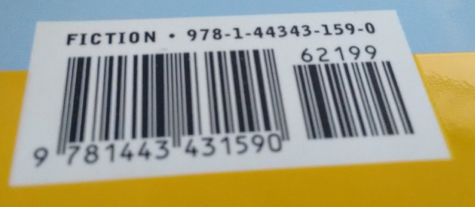
The bar code scanner built into the app reads the bar code as as 9781443431590:
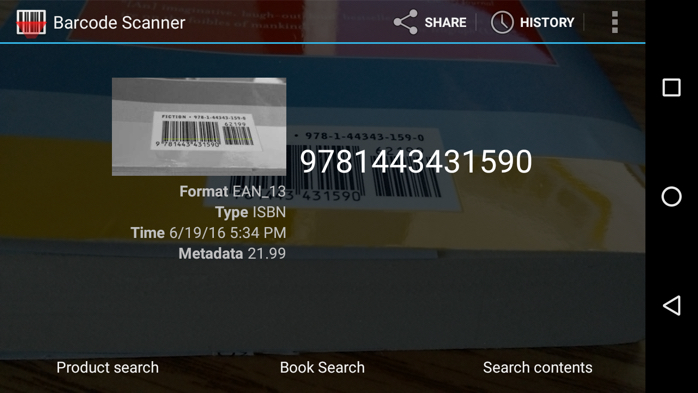
My app then speaks Z39.50 to the Provincial Library Catalogue, searching for the ISBN:
Z> find "9781443431590"
Sent searchRequest.
Received SearchResponse.
Search was a success.
Number of hits: 1, setno 1
records returned: 0
Elapsed: 0.090130
One record was found, so the app looks up the details:
Z> show 1
Sent presentRequest (1+1).
Records: 1
[DEFAULT]Record type: USmarc
(Length implementation at offset 22 should hold a number. Assuming 0)
02597 am a2200457Ii 4500
001 859586132
003 OCoLC
005 20140429084539.0
008 131007t20142013nyu 000 f eng d
020 $a 9780062329127
020 $a 006232912X
020 $a 9780007557905 (tr. pbk.)
020 $a 9781443431590 (tr. pbk.)
040 $a BTCTA $b eng $c BTCTA $d BDX $d WIM $d OCLCQ $d YDXCP $d CXP
041 1 $a eng $h swe
043 $a e-sw---
049 $a SPPA
090 $a F JON
100 1 $a Jonasson, Jonas, $d 1961-
245 14 $a The girl who saved the King of Sweden : $b a novel / $c Jonas Jonasson ; translated by Rachel Willson-Broyles.
246 1 $i Pre-publication title was given as: $a Illiterate Who Could Count.
250 $a First Edition.
260 $a New York : $b Ecco Press, $c c2014.
300 $a 387 pages ; $c 24 cm.
336 $a text $b txt $2 rdacontent.
337 $a unmediated $b n $2 rdamedia.
338 $a volume $b nc $2 rdacarrier.
520 $a "In a tiny shack in the largest township in South Africa, Nombeko Mayeki is born. Put to work at five years old and orphaned at ten, she quickly learns that the world expects nothing more from her than to die young, be it from drugs, alcohol, or just plain despair. But Nombeko has grander plans. She learns to read and write, and at just fifteen, using her cunning and fearlessness, she makes it out of Soweto with millions of smuggled diamonds in her possession. Then things take a turn for the worse... Nombeko ends up the prisoner of an incompetent engineer in a research facility working on South Africa's secret nuclear arsenal. Yet the unstoppable Nombeko pulls off a daring escape to Sweden, where she meets twins named Holger One and Holger Two, who are carrying out a mission to bring down the Swedish monarchy...by any means necessary. Nombeko's life ends up hopelessly intertwined with the lives of the twins, and when the twins arrange to kidnap the Swedish king and prime minister, it is up to our unlikely heroine to save the day--and possibly the world"--from publisher's web site.
650 0 $a South Africans $z Sweden $v Fiction.
650 0 $a Nuclear weapons $v Fiction.
650 0 $a Twins $v Fiction.
651 0 $a Sweden $x Kings and rulers $v Fiction.
700 1 $a Willson-Broyles, Rachel.
596 $a 1 6 7 16 24 25
926 $a CHA $b AF $c F JON $d BOOK $f 4
926 $a CHA $b CHECKEDOUT $c F JON $d BOOK $e 9/7/2016 $f 5
926 $a CHA $b AF $c F JON $d BOOK $f 6
926 $a COR $b AF $c F JON $d BOOK $f 1
926 $a MON $b CHECKEDOUT $c F JON $d BOOK $e 2/7/2016 $f 1
926 $a STR $b AF $c F JON $d BOOK $f 1
926 $a SUM $b AF $c F JON $d BOOK $f 1
nextResultSetPosition = 2
Elapsed: 0.401591
The app decodes the MARC record and deduces that there are two copies available at my local branch in Charlottetown:
926 $a CHA $b AF $c F JON $d BOOK $f 4
926 $a CHA $b AF $c F JON $d BOOK $f 6
At this point my app could open up a web browser to:
http://catalogue.library.pe.ca/uhtbin/cgisirsi.exe/x/0/0/5?searchdata1=9781443431590
which is a deep link to this book in the library catalogue. From this point I could place a hold on the book and then go to the library to pick up a copy:
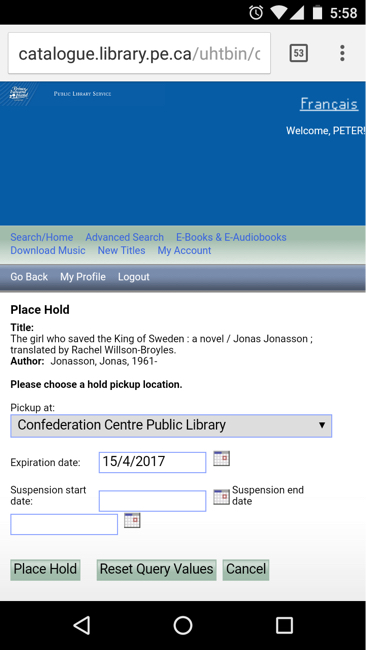
Z39.50 is open data in its finest form, and our Provincial Library System’s catalogue has been speaking Z39.50 for many years. We owe a debt of gratitude to librarians past and present for breaking the trail.
Here’s Catherine simultaneously talking on the phone to her nieces, receiving a birthday birdhouse, and blowing out the candle on her Chinese Birthday Bun.
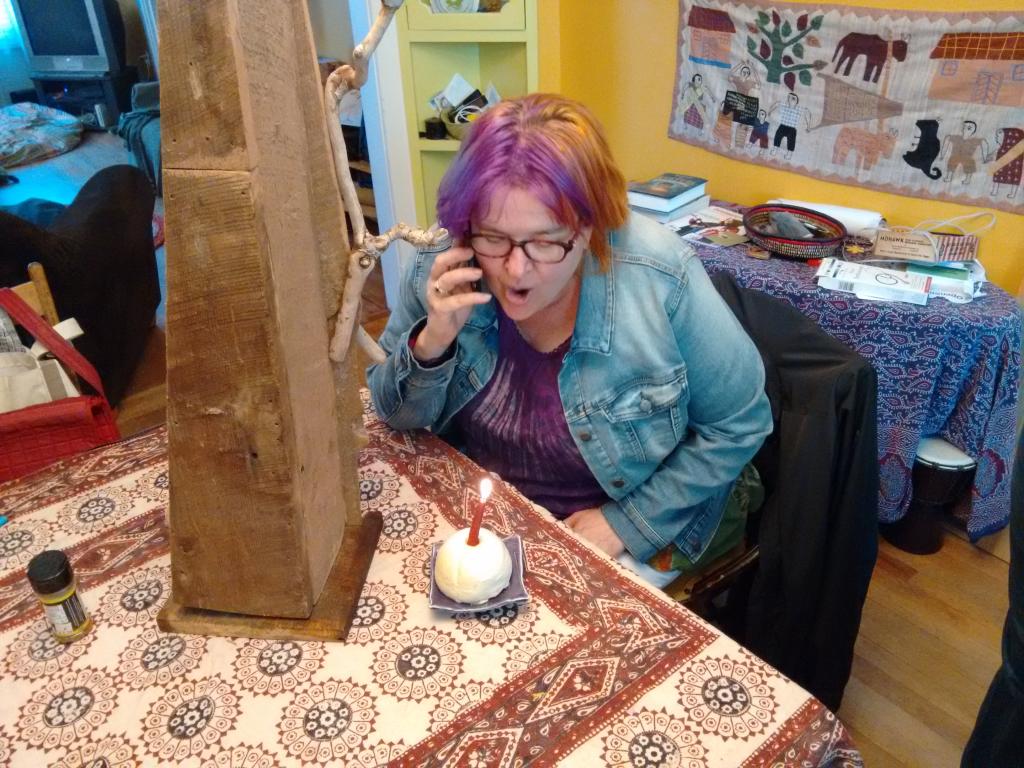
I recorded this with my phone on approach to Charlottetown Airport last Saturday morning. I was flying in an Air Canada Beechcraft 1900D, a tiny 18 seat plane that’s used on the Halifax-Charlottetown runs. The sun was positioned perfectly for the plane to be able to chase its shadow home. The scene opens as we fly over the Atlantic Superstore and the University of Prince Edward Island.


 I am
I am